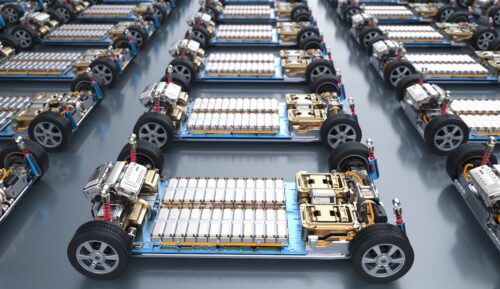3d rendering group of electric cars with pack of battery cells module on platform in a row

RMI Joins Global Battery Alliance to Advance a Circular, Responsible, and Just Battery Value Chain
June 5, 2023 — Boulder, CO
RMI is pleased to announce that it has become a nonprofit member of the Global Battery Alliance (GBA), a significant step that will accelerate the clean energy nonprofit’s efforts to advance a robust circular battery economy.
“The members of the GBA have been working together on defining the parameters of sustainable, responsible, and circular battery value chains, including through our flagship initiative of the battery passport. Integrating perspectives, expertise, and expectations from nongovernmental organizations such as RMI is a priority for the GBA. We are thrilled to welcome RMI as a new member and look forward to leveraging their expertise as we work on creating a sustainable battery value chain by 2030,” said Inga Petersen, executive director of the Global Battery Alliance.
“No one organization or government will be able to achieve a sustainable circular battery value chain alone,” said RMI Managing Director Clay Stranger. “That’s why the GBA’s work is so effective, and why we’re thrilled to join the alliance — we are, as the saying goes, greater than the sum of our parts. Our membership in GBA will help RMI, in partnership with other members, effect change on a much larger scale.”
The announcement comes as the EV battery supply chain undergoes increasing scrutiny, and for good reason: extraction of the minerals needed to produce EV batteries, known as the upstream portion of the supply chain, often uses mining practices associated with human rights abuses and environmental degradation.
Experts worldwide have also noted that the entire supply chain, which is geographically concentrated, is vulnerable to disruptions from natural disasters, geopolitical events, and changing trade alliances; its current fragility risks stalling EV adoption, which continues to grow worldwide. Lastly, many worry that the hazardous waste from discarded batteries will continue to harm local communities and environments.
Battery circularity, which involves repurposing, reusing, and recycling used batteries, can help address many of these issues. Giving used batteries new life decreases the industry’s reliance on finite virgin materials and the human rights risks associated with their extraction and processing. Circularity will also help the supply chain weather disruptions since a resilient circular battery economy will lessen the need for new batteries. True circularity also results in fewer batteries in good state of health from being discarded.
As demand for EVs has grown, RMI has increased its focus on battery circularity, with an emphasis on how to embed equity in the transition to electric transportation so that benefits reach all communities. In pursuit of this goal, it recently launched the Battery Circular Economy Initiative (BCEI), designed to ensure that the growth of the EV battery industry protects human rights and the environment while fostering efficiencies across the entire value chain to recover 100 percent of useable EV battery materials.
The BCEI will leverage RMI’s reputation in the clean energy transition space to convene public and private stakeholders who will identify the barriers to implementing a truly just transition for transportation electrification; produce data-driven and applicable insights; and design roadmaps that can help policymakers and investors make informed decisions to advance a circular battery economy. One of the initiative’s first steps will be creating a dashboard that identifies opportunities for enhanced circularity through investment, operational efficiencies, and emissions reductions by value chain tier.
RMI’s data-driven insights will help measure regional economies’ proximity to achieving full circularity for EV batteries and key actions that will enable circularity. Other areas of focus include improving supply chain transparency; ensuring that legislation effectively addresses supply chain issues; setting best practices relating to the reuse, recycling, and repurposing processes; and raising awareness of the importance and benefits of creating a circular battery economy.
About the Global Battery Alliance
The Global Battery Alliance (GBA) is a public-private collaboration platform founded in 2017 at the World Economic Forum to help establish a sustainable battery value chain by 2030. The GBA brings together leading international organizations, NGOs, industry actors, academics, and multiple governments to align collectively in a pre-competitive approach, to drive systemic change along the entire value chain. Incubated by the World Economic Forum in 2017 until its independence in 2021, members of the Alliance collaborate to achieve the goals set out in the GBA 2030 Vision and agree to the Ten GBA Guiding Principles. The GBA’s multi-stakeholder governance structure aims to ensure inclusivity in decision-making and strategic focus. Action Partnerships provide a collaborative platform for members to pool their expertise to achieve the shared goals of circularity, environmental protection, and sustainable development.
